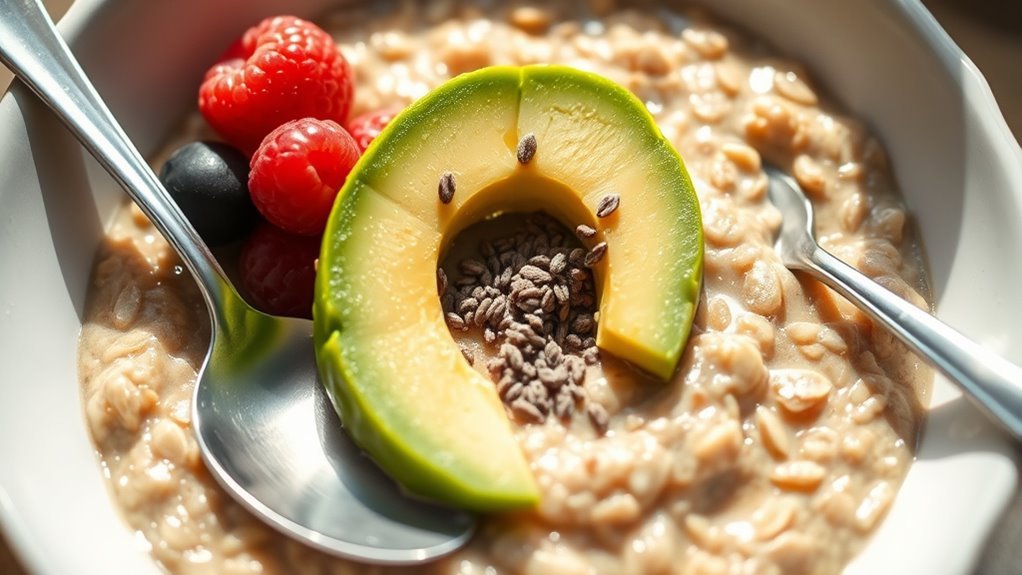Oatmeal isn’t keto-friendly due to its high carbohydrate content, which can hinder your ability to stay in ketosis. A typical serving contains around 27 grams of carbs, making it hard to fit into your low-carb goals. While oatmeal does offer fiber and essential nutrients, its carb load can spike blood sugar levels. If you’re looking for alternatives or ways to balance oatmeal within a keto diet, there are plenty of options to explore.
Understanding the Keto Diet Basics

When you’re exploring the keto diet, it’s vital to understand its basic principles. At its core, the keto diet focuses on considerably reducing carbohydrates while increasing your intake of dietary fats. This shift encourages your body to enter a state of ketosis, where it burns fat for fuel instead of glucose. Emphasizing healthy fats—like avocados, nuts, and olive oil—supports energy levels and promotes satiety, giving you freedom from constant hunger. It’s important to select nutrient-dense foods that align with keto principles, ensuring you get the vitamins and minerals your body needs. By incorporating these strategies, you’ll not only enhance your health but also enjoy the benefits of a low-carb lifestyle, making it easier to maintain long-term success.
Nutritional Profile of Oatmeal

Understanding the keto diet’s focus on low carbohydrate intake naturally leads to questions about common foods, such as oatmeal. Oatmeal offers several benefits, including being a good source of fiber, which can aid digestion and promote a feeling of fullness. It also provides essential nutrients like iron and magnesium. However, oatmeal does have its drawbacks. It’s relatively high in carbohydrates, which can hinder your goal of maintaining ketosis. A typical serving contains around 27 grams of carbs, making it a challenging fit for strict keto dieters. If you’re aiming for a balanced diet while enjoying oatmeal, consider portion control and pairing it with low-carb toppings. Ultimately, knowing both oatmeal benefits and drawbacks is key to making informed dietary choices.
Carbohydrates: The Key Concern

Although oatmeal is often celebrated for its health benefits, the high carbohydrate content is a major concern for those following a keto diet. When you’re trying to minimize carbs, you need to pay attention to carbohydrate types. Oatmeal primarily consists of complex carbohydrates, which can spike your blood sugar levels, making it hard to stay in ketosis. While oatmeal does have some fiber content, which is beneficial for digestion, it’s not enough to offset the total carb count. A single serving can contain around 27 grams of carbs, which limits your daily intake considerably. If you’re aiming for a keto lifestyle, you might want to explore lower-carb alternatives that align better with your dietary goals.
Types of Oatmeal and Their Impact
When considering oatmeal on a keto diet, it’s crucial to understand the different varieties and their carbohydrate content. Instant oats, for instance, often have higher carb levels compared to steel-cut or rolled oats. By comparing these options, you can make informed choices that align better with your nutritional goals.
Oatmeal Varieties Explained
While you might think all oatmeal is created equal, the type you choose can greatly impact your diet, especially if you’re following a keto lifestyle. There are various oatmeal types, like steel-cut, rolled, and instant, each with different cooking methods and nutritional variations. For instance, steel-cut oats take longer to prepare but offer more fiber and lower glycemic impact, making them a healthier option. You can enhance flavors with nuts, seeds, or low-carb fruits while keeping an eye on serving suggestions to stay on track. Preparation tips include soaking your oats overnight or using a slow cooker for creamy results. Explore recipe ideas like savory oatmeal bowls for a nutrient-packed meal that supports your health benefits while enjoying the freedom of choice.
Carb Content Comparison
Understanding the carb content of different oatmeal types is essential if you’re managing your carbohydrate intake on a keto diet. Here’s a quick comparison to guide you:
- Instant Oatmeal: High in carbs, often contains added sugars.
- Rolled Oats: Moderate carb content, but still not ideal for keto.
- Steel-Cut Oats: Lower in carbs than rolled oats, but still may be too high.
- Oatmeal Substitutes: Consider alternatives like chia seeds or flaxseed meal for low-carb options.
When looking for keto snacks, these substitutes can help you stay within your carb limits while enjoying tasty, nutritious options. Remember, awareness of carb content empowers you to make informed choices on your keto journey.
Oatmeal’s Glycemic Index and Blood Sugar
Although oatmeal is often praised for its health benefits, its glycemic index (GI) is a critical factor to contemplate, especially if you’re monitoring blood sugar levels. The GI measures how quickly a food raises your blood sugar, and oatmeal generally has a moderate GI. This means it can lead to a notable glycemic response, particularly if consumed in large portions or without balancing fats or proteins. If you’re focused on blood sugar regulation, consider choosing steel-cut or rolled oats over instant varieties, as they tend to have a lower GI. Pairing oatmeal with healthy fats or proteins can further stabilize your blood sugar, giving you more freedom in your diet while still enjoying this popular breakfast choice.
Potential Health Benefits of Oatmeal
Oatmeal boasts a nutrient-dense profile, offering essential vitamins and minerals that support overall health. Its fiber content can help lower cholesterol levels, promoting heart health. By incorporating oatmeal into your diet, you’re not just enjoying a tasty meal; you’re also benefiting your body in meaningful ways.
Nutrient Density Profile
When it comes to nutrient density, oatmeal stands out as a powerhouse of essential vitamins and minerals. This makes it a great choice for those looking to enhance their diet. Oatmeal’s nutrient profile supports optimal nutrient absorption and is rich in dietary fiber, which can promote digestive health. Here are some key benefits:
- High in antioxidants that can combat oxidative stress
- Rich in B vitamins which play a crucial role in energy metabolism
- Contains minerals like magnesium and iron essential for overall health
- Offers beta-glucans, a type of soluble fiber that helps regulate blood sugar
Incorporating oatmeal into your meals not only boosts your nutrient intake but also contributes to a balanced, health-focused lifestyle.
Heart Health Support
While many people enjoy oatmeal for its comforting texture and taste, it also offers significant benefits for heart health. Oatmeal is rich in soluble fiber, particularly beta-glucan, which plays an essential role in cholesterol management. This type of fiber helps lower LDL cholesterol levels, reducing the risk of heart disease. Additionally, the antioxidants found in oats can combat inflammation, supporting overall cardiovascular health. When you incorporate oatmeal into your diet, you’re not just enjoying a delicious meal; you’re also taking a proactive step toward maintaining a healthy heart. Embracing this nutrient-dense food can empower you to make choices that support your wellness journey, giving you the freedom to prioritize your heart health without sacrificing flavor.
Alternatives to Oatmeal on Keto
If you’re looking for satisfying breakfast options that fit within a keto diet, there are several alternatives to oatmeal that can keep your carb intake in check. Here are some delicious oatmeal substitutes to contemplate:
- Chia pudding: Packed with fiber and omega-3s, it’s a filling option.
- Coconut yogurt: Low in carbs and rich in healthy fats.
- Almond flour pancakes: A tasty way to enjoy pancakes while staying keto-friendly.
- Flaxseed meal porridge: A nutrient-dense, low-carb alternative.
You can also incorporate low carb cereals, cauliflower rice, or nut butters to add variety to your breakfast. These options not only satisfy your hunger but also provide essential nutrients, allowing you to enjoy freedom while sticking to your keto lifestyle.
Incorporating Oatmeal in a Keto Diet
Many people following a keto diet might think oatmeal is off the table due to its carbohydrate content. However, you can still enjoy oatmeal by choosing lower-carb options, like chia seed oatmeal or using almond flour. These alternatives can be delicious oatmeal recipes that fit your lifestyle. You can also incorporate oatmeal in small portions to create keto snacks, mixing it with nut butter or seeds for added healthy fats. By focusing on fiber-rich and nutrient-dense ingredients, you’ll enhance the overall quality of your meals. Remember, it’s all about finding balance and making smart choices that align with your keto goals while still enjoying the comfort of oatmeal-inspired dishes.
Portion Control and Moderation
When it comes to oatmeal on a keto diet, serving size really matters. Eating a small portion can help you stay within your carb limits while still enjoying the nutritional benefits. Balancing oatmeal with other low-carb foods can also enhance your meal without compromising your dietary goals.
Serving Size Matters
Portion control plays an essential role in determining whether oatmeal fits into a keto diet. Understanding serving sizes can help you enjoy oatmeal while staying within your carb limits. Here are some effective serving suggestions:
- Stick to ¼ cup of dry oats for lower carb impact
- Pair oats with high-fat ingredients like almond butter or coconut oil
- Add low-carb toppings such as berries or seeds
- Monitor your overall daily carb intake to maintain ketosis
Balance With Other Foods
To successfully incorporate oatmeal into a keto diet, balancing it with other foods is key. You can enjoy oatmeal while staying within your carb limits by controlling portions and adding nutrient-dense toppings. Consider using low-carb oatmeal toppings like nuts, seeds, or berries, which not only enhance flavor but also provide healthy fats and fiber sources. These additions can improve satiety and help you maintain energy levels throughout the day. Aim for a balanced plate that includes protein and healthy fats alongside your oatmeal. By being mindful of portion sizes and complementing oatmeal with keto-friendly ingredients, you can enjoy its benefits while adhering to your dietary goals, ensuring you feel free and satisfied.
Final Thoughts on Oatmeal and Keto
Although oatmeal is often celebrated for its health benefits, its compatibility with a ketogenic diet is a topic of debate. If you’re considering oatmeal on keto, here are some factors to weigh:
Oatmeal’s health benefits clash with keto’s low-carb goals, prompting a thoughtful evaluation of your dietary choices.
- High carb content can disrupt ketosis.
- Fiber and nutrients are beneficial but may not justify the carbs.
- Oatmeal substitutes like chia seeds or flaxseed meal can fit better.
- Making keto adjustments, like portion control, can help balance your meals.
Ultimately, if you’re looking for freedom on your keto journey, you might find that alternatives offer a more suitable option. Focus on nourishing your body while maintaining your goals, and don’t hesitate to explore exciting oatmeal substitutes that keep you in line with your keto lifestyle.
Is oatmeal keto friendly?
Oatmeal is generally not considered keto-friendly due to its high carbohydrate content. A typical serving of oatmeal contains around 27 grams of carbohydrates, which is significantly higher than the daily carb limit for a standard ketogenic diet (usually between 20-50 grams). Therefore, while oatmeal is healthy and nutritious, it is not compatible with the strict carb restrictions of the keto diet.
What are the alternatives to oatmeal for a keto diet?
There are several great alternatives to oatmeal that fit within a keto diet. Some popular options include chia seed pudding, flaxseed meal, or almond flour porridge. These alternatives are typically lower in carbs and can provide a similar texture or flavor profile. Additionally, you can also try unsweetened coconut flakes or a combination of nuts and seeds to replicate the experience of oatmeal.
Can I eat oatmeal in moderation on a keto diet?
While oatmeal is not keto-friendly, some individuals on a more relaxed version of the keto diet may choose to incorporate very small portions of oatmeal into their meals. However, this should be done with caution and awareness of your overall carbohydrate intake for the day. For example, having a tablespoon of oatmeal mixed with other low-carb ingredients might be acceptable, but it’s crucial to monitor how it fits into your daily carb limit.
What are the health benefits of oatmeal?
Oatmeal is rich in fiber, particularly beta-glucan, which can help lower cholesterol levels, improve heart health, and enhance feelings of fullness. It also contains important nutrients like vitamins, minerals, and antioxidants. While it may not be suitable for a strict keto diet, oatmeal can be a beneficial part of a balanced diet for those who are not following a low-carb regimen.
Are there any low-carb oats available?
There are some products marketed as low-carb oats or keto oats that are made from ingredients such as coconut or almond flour, which can be lower in carbohydrates compared to traditional oats. These alternatives can provide a similar texture and cooking experience, making them suitable for those following a keto diet. Always check the nutritional label to ensure they meet your dietary needs.
References
- https://www.healthline.com/nutrition/oatmeal-keto-friendly
- https://www.ncbi.nlm.nih.gov/pmc/articles/PMC5707681/
- https://www.mayoclinic.org/healthy-lifestyle/nutrition-and-healthy-eating/expert-answers/oatmeal-and-keto-diet/faq-20457571
- https://www.webmd.com/diet/obesity/what-is-the-keto-diet
- https://www.theglobeandmail.com/life/health-and-fitness/health/what-to-know-about-the-keto-diet/article37755738/
- https://www.verywellfit.com/the-keto-diet-explained-5182770
- https://www.washingtonpost.com/food/2020/01/30/keto-diet-what-you-need-know/
- https://www.cdc.gov/healthyweight/healthy_eating/index.html


